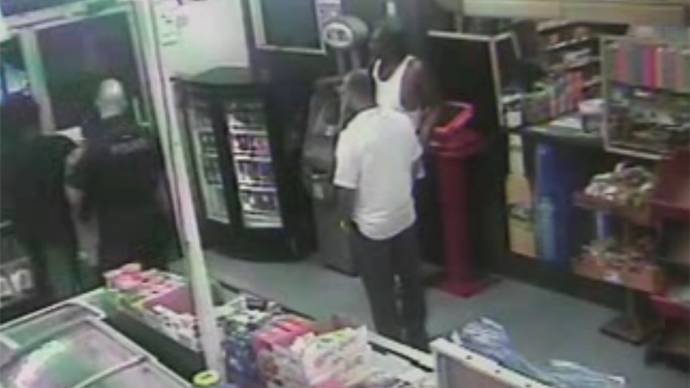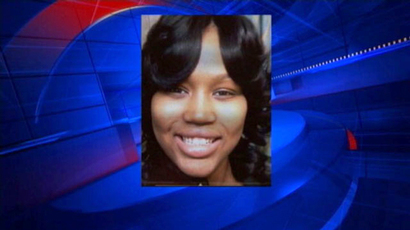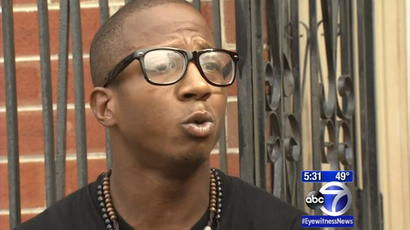Store clerk arrested for ‘trespassing’ at work dozens of times in Florida town

Miami Gardens, Florida police routinely hassled and arrested patrons and workers at a convenience store for minor, at times fabricated, infractions, arresting one employee over 250 times in four years in a case of seemingly abusive policing.
The Miami Herald reported Thursday on one convenience store owner
in Miami Gardens, a town of 109,000 in Miami-Dade County, who had
originally agreed with local police around three years ago to
join in on their “zero tolerance” policy in the city to
reduce crime, putting a sign in the store’s window announcing his
cooperation.
The owner of 207 Quikstop, Alex Saleh, said he immediately regretted making such a deal with the Miami Gardens Police Department.
He said the police began stopping random and longtime, trusted patrons and his own employees regularly, writing them up for minor infractions like trespassing or having an open container of alcohol, frisking them, reaching into pockets and overall hassling citizens. Yet Saleh said he was bothered most by the brazen nature of the police aggression inside the store, where they would enter and search the store without his permission, often taking employees outside in the middle of their shifts despite protests from Saleh.
One employee who has been a particular target is Earl Sampson, 28, who has been stopped and questioned by police 258 times in four years, searched more than 100 times and arrested and jailed 56 times. Yet Sampson has never been convicted anything more serious than marijuana possession. He has been arrested most for trespassing, nearly every time at 207 Quikstop, his workplace.
“We have people shooting, killing, robberies. This is really ridiculous that they spend so much time arresting people for trespassing,” Sampson said.
Saleh eventually took the “zero tolerance” sign down and told police he no longer wanted to cooperate with them in the policy, yet they continued on and even replaced the sign for him without permission.
“They have specialized units to combat crime and they need to bring in the numbers to justify those units,’’ said Saleh, a native of Venezuela who is of Palestinian descent.
Saleh said police officers often used racial slurs at his customers, most of them poor and black, treating them like hardened criminals and giving some multiple infractions in one day.
“Police line them up and tell them to put their hands against the wall. I started asking myself ‘Is this normal?’ I just kept thinking police can’t do this,’’ said Saleh, 36.
In June 2012, he installed 15 surveillance cameras in the store, not to catch criminals but to watch the police. He collected over two dozen videos showing a multitude of instances where cops used excessive force, issue unwarranted citations and filed inaccurate police reports in connection with arrests, the Herald reports.
“There is just no justifying this kind of behavior,’’ said Chuck Drago, a former police officer and consultant on police policy. “Nobody can justify overstepping the constitution to fight crime.”
The “broken windows theory” of policing - which says cutting out petty crimes like trespassing and vandalism can help root out more violent crime - employed by Miami Gardens was never accompanied with efforts to get to know community members, he said.
“The real problem here,’’ Drago said, “is the police department does not have a relationship with its community - black or white. When they make these kinds of stops for minor offenses, it only re-enforces the mistrust.’’
Eventually, videos in hand, Saleh filed an internal affairs complaint about the police behavior at the store. He said after that, police aggression and intimidation increased. In one instance, six members of the department’s Rapid Action Deployment (RAD) squad entered the store. Five of them silently lined up, shoulder to shoulder, blocking aisles of the store as one went to the restroom. “Can I help you?” Saleh recalls asking. After a silent ten minutes, the cops all marched out.
Saleh said he is preparing to file a federal civil rights lawsuit alleging racial profiling, illegal stops and searches and the covering up of police misconduct, all ordered from the highest reaches of the department.
Since serving notice of the suit, Sampson has not been arrested and police aren’t as active in the store’s parking lot. Yet Saleh is still mindful of the battle ahead of him. In December, he says he was pulled over after leaving the store and told he had a broken tag light. Soon, he said a total of six officers were on the scene.
“I thought, you know, there is a lot of serious crime in Miami Gardens,’’ Saleh said. “Why do they need six police officers on a car stop with a burned-out tag light?’’
One officer opened his car door to check inside a bag with the store’s money, Saleh said. They found a gun Saleh was licensed to carry, though they cited him for the broken light, tinted windows and bald tires. Before leaving him, Saleh alleges the unit’s then-sergeant Martin Santiago said to him, “I’m going to get you mother-f-----.” The next day, Saleh said he reviewed the store video of his exit from the parking lot the night prior. His tag light was working, he said.
Miami Gardens Police Chief Matthew Boyd and City Manager Cameron Benson did not respond to repeated attempts for comment by the Herald, though Boyd issued a statement saying the department was committed to serving and protecting all citizens and businesses of the city.
“They say on the car they’re supposed to protect and serve, though, but you’re not protecting and serving, you’re harassing,” Sampson told CBS 4 in Miami.














